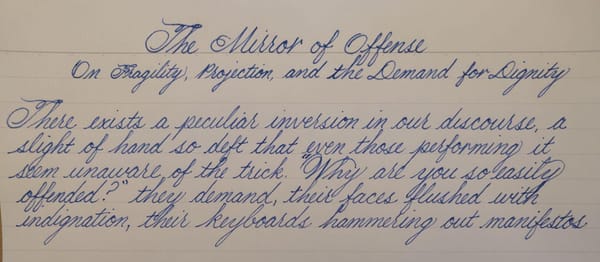Moving the Needle: Why Allyship and Support Requires More Than Good Intentions
When it comes to politics, it is not what you say that matters, it is what you do.

With Pride coming up, I really want to take a moment to talk about some introspection, allyship, and tangible outcomes.
Not just any allyship. I mean the kind that lives in our social media bios but rarely makes it past our keyboards. The kind that feels good but costs nothing. You know the type. Flags, pins, emojis, and slogans.
Allyship isn’t a hobby, and too many of us treat it like one. We change our profile pictures during Pride month. We share the right hashtags when tragedy strikes. We know which flags have which colors, or at least, we think we do until we make that embarrassing mistake that reveals we haven’t been paying quite enough attention.
I’ve been watching this pattern play out across social media. Someone well-meaning shares a supportive quote about justice with the wrong flag in the background, or similar gaffe. They genuinely want to help, but they haven’t done the homework. Then come the pile-ons, the explanations, the defensiveness, and criticisms. It becomes infighting that causes schisms, not unity in common purpose. All of which is generating plenty of heat, but precious little light.
And here’s where I need to look in the mirror. I too, catch myself doing this. Something transphobic appears on my timeline, and suddenly I’m four hours deep in a comment thread battle that isn’t going to win the other person over, feeling like I’ve done something meaningful, when all I’ve really done is neglect the real work that needed doing. The dopamine hit of online activism is real, and it’s just about as substantial as cotton candy.
That is not to say it doesn’t have its place. Fact-checking, journalism, research, and telling our stories, representation in media - these are all powerful, purposeful, and precious. At the same time, your beliefs are worthless unless they’re converted into action. Real, tangible action.
Politics is a hobby for many folks. There’s nothing wrong with that in and of itself. There isn’t. In fact, in many ways it’s a good thing. It gets you interested, it gets you believing in something. It gets you engaged with the news and the world around you. But as my father used to ask “What do you have to show for your time?”
And let’s not forget for most of us, politics isn’t just a hobby. We don’t have the luxury of engaging with politics as just a hobby. Regardless if we want to be politicized or not, our existence has become political. And politics is power. It’s a game, it’s a tug-of-war, but it’s one of the few games where the points are measured in human lives and the quality of those lives.
So we should probably stop treating it like a hobby, like a thing that we, or others, have to get right or perfect. Where others have to be precisely on the same side as us in order to row together. We should probably stop that because politics isn’t a hobby. Politics is power. It’s always about power, and it doesn’t matter where on the political spectrum you lie, that’s what it’s going to ultimately be about.
This goes for everyone: straight allies, gay folks supportive of trans rights, white people claiming to support racial justice. Even those of us within the LGBTQ+ community can fall into treating the struggles of others in our coalition as theoretical exercises rather than lived realities requiring real action.
When we treat allyship like a hobby, we’re playing with other people’s lives. Every meme shared instead of a call made to a representative, every online argument instead of a donation of time and money to a community organization, every hashtag instead of showing up at a school board meeting or escorting someone to the care they need - these are all choices with real consequences.
The difference between hobby allyship and the real thing is simple: tangible action. It’s the difference between knowing the right terminology and actually creating space where people can exist safely. It’s the difference between retweeting support and testifying against anti-trans legislation. It’s one thing to say that the world should accept trans people with equality and respect, it’s another to invite them into your life, and to stand with them. I personally don’t care if you use the wrong terminology, or terms from 30 years ago, if you have chosen to show up. We can educate, we can mentor, we can work with that, because you showed up.
For those of us within the LGBTQ+ community, it means recognizing when we’ve gotten comfortable enough to treat others’ struggles as theoretical. For those outside, it means understanding that allyship isn’t about feeling good or making the right noise. It’s about doing good, even when it’s inconvenient or uncomfortable or hard; especially when it’s inconvenient and uncomfortable and hard.
So here’s my challenge to all of us: once a month, minimum, convert your online passion into offline impact. Make the call. Attend the meeting. Have the uncomfortable conversation with family, friends, or neighbors. Donate money and time to organizations doing the work. Show up. Learn the actual needs of the community from the community itself. Help carry that weight.
And what better month to start that than pride month, right? The one month where maybe it is just a bit easier to be visible and put yourself out there.
Because at the end of the day, the quality of marginalized lives isn’t measured in retweets or likes. It’s measured in legal protections, healthcare access, physical safety, quality of life, and community support.
2025 is already looking like a pivotal year for LGBTQ+ rights, to put it mildly. We don’t have the luxury of hobby allyship anymore. We need to seize the initiative now, because human rights aren’t a game - even if too many of us have been playing it like one before.
This isn’t about shame, it’s about clarity. It isn’t about blame, it’s about it’s about honesty and personal accountability. It’s about principles, and yes, power. The power to be equal and free. And it’s about time we stopped treating other people’s existence like our favorite pastime or pieces on a board. Because you can believe that you are a good ally, that you are a good gay, or a good bi, or that you do or have done your part for women’s lib, or whatever else that you do that makes you feel better about yourself. You can even sit there and say how you won’t budge until you see some change because of past wrongs, on principle, believing that is going to bring about change. The fact is that your beliefs do not move the needle, but your actions do. Your beliefs are meaningless unless and until they are converted into action.


